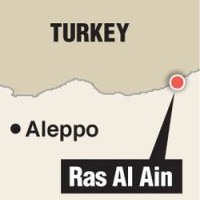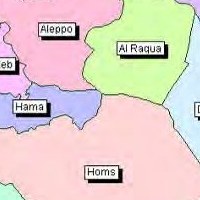![]()
Monday, August 10, 2015 | by Aron Lund
The following article was originally published as part of Carnegie’s Syria in Crisis series under the title “As Rifts Open Up in Syria’s al-Qaeda Franchise, Secrets Spill Out.” This article is an enumeration of various events which led to the jihadi civil war now raging in Syria and Iraq.
In July, the al-Qaeda branch known as the Nusra Front expelled one of its founding members a man known as Saleh al-Hamawi. As described in Friday’s post, another founding member of the group, Abu Maria al-Qahtani, has reportedly been sidelined and stripped of power.
With the Syrian jihadis’ internal debates increasingly spilling online, one recent social media posting has revealed new details about the Nusra Front’s mysterious leader, Abu Mohammad al-Golani, and the self-proclaimed Islamic State’s “caliph” Abu Bakr al-Baghdadi.
Hudheifa Azzam Takes to Twitter
Hudheifa Azzam is the son of the legendary Palestinian Islamist ideologue Abdullah Azzam. The elder Azzam is often regarded as the founder of the modern jihadi movement, although it is not obvious he would have liked the direction it later took. Differences between Azzam and his junior associate in 1980s Afghanistan and Pakistan, a Saudi by the name of Osama bin Laden, were already apparent at the time of Azzam’s mysterious death in 1989.
As a young man, Azzam’s son Hudheifa worked with his father in support of the Afghan resistance against the Soviet Union, and he remained active on the jihadi scene. Recently, he left Jordan to settle in northern Syria, where he has presented himself as an independent scholar. He seems to work closely with Syrian Islamist hardliners like Ahrar al-Sham, but he is a strong opponent of the Islamic State and has been critical of the Nusra Front and al-Qaeda as well.
Like many other independent Islamist figures in Syria, Hudheifa Azzam has found Twitter to be an excellent means of broadcasting his opinions. On July 21, he fired off a series of tweets targeted at the Islamic State leader Abu Bakr al-Baghdadi. The information in these tweets was vouched for by two Nusra Front dissidents, Saleh al-Hamawi and Abu Maria al-Qahtani, who were to varying degrees involved in the events he describes.
In short, Azzam’s story is as follows, with the addition of a great deal of context for clarity. Whether you think his information is to be trusted or not is up to you.
Golani, Baghdadi, and Mohammed Hardan
The Nusra Front leader Abu Mohammad al-Golani formerly fought the United States in Iraq. He was a member of the Iraqi wing of al-Qaeda, which became the Islamic State. At some point in this period, Golani was captured and sent to a U.S. military prison, probably Camp Bucca in southern Iraq. Azzam reveals that Golani used a cover name to hide his Syrian background, calling himself “Aws al-Mosuli.” The American prison administration never found out his real identity, writes Azzam, and Golani “entered prison and left it again as Aws al-Mosuli.”
In prison, Golani/Mosuli coincidentally ended up in the same cell as the Iraqi religious scholar and militant leader Mohammed Hardan, who has also used a variety of aliases, among them Abu Abdullah al-Mansour, Abu Said al-Essawi, and Abu Said al-Iraqi. Originally a member of the Iraqi Muslim Brotherhood, Hardan had long ago left the organization and gone to fight in Afghanistan. There, rubbing shoulders with al-Qaeda leaders, he adopted a more hardline Salafi-jihadi creed.
After the U.S. invasion of Iraq in 2003, Hardan co-created a Sunni Islamist resistance faction called the Mujahideen Army (not to be confused with the Syrian group of the same name) and became its leader. It grew into one of Iraq’s most powerful Sunni militias. Although its membership was overwhelmingly Iraqi, it worked side by side with foreign jihadis in Hardan’s hometown Fallujah. However, when al-Qaeda in Iraq transformed into the Islamic State of Iraq in 2006 and demanded obedience from other factions, relations began to sour. After accusations of treachery back and forth, the two groups started fighting. This coincided with the American “surge” in 2007 and both groups were badly damaged. Although the Islamic State would rise again after 2010 and has been in control of much of Sunni Iraq since 2014, the Mujahideen Army seems to be virtually defunct today.
As it happens, Hardan was also associated with one Ibrahim al-Awwad — a lesser religious scholar from Samarra — who would eventually gain global infamy under the name Abu Bakr al-Baghdadi. Apparently, Hardan had been his religious teacher.
The claims of a connection between Hardan and Baghdadi are not part of the Bahraini theologian Turki al-Binaali’s semiofficial biography of Baghdadi — a hagiographical piece often circulated by Islamic State supporters and adopted largely uncritically by terrorism researchers in the West — but they have popped up in reporting and jihadi gossip several times before. For example, such a connection was discussed by the Palestinian journalist Wael Essam in a report in the London-based newspaper al-Quds al-Arabi.
To continue reading the full article, please click here.



 RSS
RSS











Latest Comments
Hello Mike, Thank you for your positive feedback to the article. I felt there wasn’t too much critical analysis of ...
Thanks for this considered and well constructed article. A follow up article on the manner in which the editorial contro...
THE CLUELESSNESS OF CLAIMING THAT OBAMA'S MIDDLE EAST POLICIES WERE A FAILURE CANNOT BE FURTHER FROM THE TRUTH, WHAT THE...
As long as Obama is the president of the usa do not trust the us government......
Thank you for an good read....